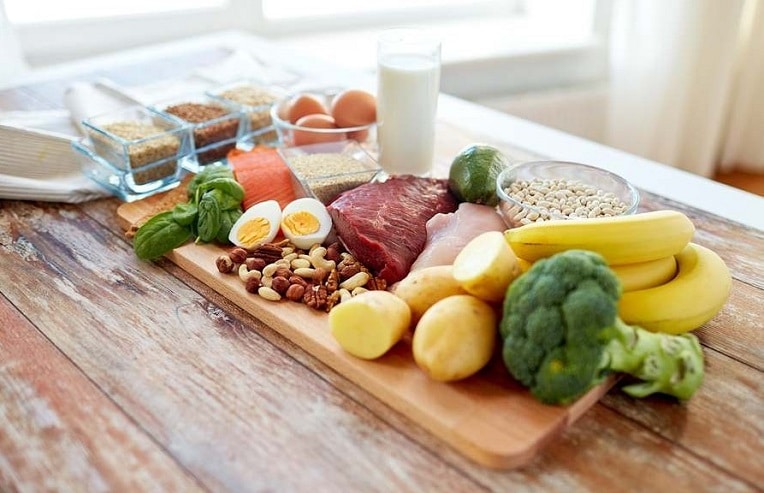For those seeking to improve their health through nutrition, the term “superfoods” is appealing. Just imagine — foods that can help you lose that stubborn belly fat, balance your hormones, or even resolve symptoms of an illness.
But “superfoods” come and go, largely depending on marketing hype. In fact, bananas were the first to carry the title “superfood” back in 1917.1 But today, you’d be hard pressed to find them listed among the top nutritional stars.
Since “superfoods” seem to change every month these days, it’s hard to know which foods to prioritize in your diet. So let’s dive into the best superfoods for women’s health with my top 7 nutrient-rich superstars to include in your daily diet for optimal health.

My Top 7 Nutrient-Packed Foods
1. Pasture-Raised Meats and Eggs
Meat has starred in the human diet for thousands of years. Some scientists even believe that meat consumption contributed the development of larger brains.2
Here are some nutrients you just can’t find in plants. Studies have found that a strict vegan diet may lead to deficiencies in several nutrients, such as:3,4
- Vitamin B12
- Zinc
- Calcium
- Selenium
- Iron
- Iodine
- Omega-3
- Vitamin B2
Furthermore, despite concerns of increased cardiovascular disease (CVD) risk from eating meat, recent reports indicate otherwise. In an article published in the Journal of the American College of Cardiology, authors wrote, “Whole-fat dairy, unprocessed meat, and dark chocolate are SFA-rich foods with a complex matrix that are not associated with increased risk of CVD. The totality of available evidence does not support further limiting the intake of such foods.”5
If you can, try to eat meat and eggs from pasture-raised animals, which graze on the foods nature intended for them. Research indicates that eggs from pasture-raised hens have a healthier fatty acid and nutrient profile than those from caged hens.6
2. Organ Meats
Today, the thought of eating organ meats may trigger an instant gag reflex in many people — why would we want to eat such things when we have modern, cutting-edge nutraceuticals?
The breakneck pace of advancements in our world makes it all too easy for us to discount the ways of the past. And nutrition is no exception.
Tradition isn’t just for nostalgia. It often contains valuable wisdom, and our ancestors prized organ meats like heart, liver, tripe, and kidney for their incredible nutrient density.
Here are a few of the best superfoods for women’s health among organ meats and their potential health benefits:
- Liver: This nutrient-dense food provides high-quality protein and significant amounts of vitamins A, B2, and B9. It also contains high levels of several minerals like zinc, iron, and copper.7 The recommended amount of liver is 100 to 250 grams per week.8
- Heart: Beef heart is a great source of choline and vitamins B1, B2, B3, B5, and B12. It also has robust levels of selenium, copper, iron, phosphorus, and zinc.9
- Kidneys: Beef kidneys are rich in vitamin B12, selenium, coenzyme Q10, and iron. It also contains decent amounts of zinc and copper.10 Kidneys contain L-ergothioneine, a natural compound that has received much attention for its protective role in cellular function.11
- Spleen: This organ meat provides high levels of iron, vitamins B12 and B3, and selenium.12 Spleen also contains peptides called tuftsin and splenopentin, both of which may enhance your immune system function.13, 14
3. Fermented Foods
Scientists have found that 70% to 80% of your immune cells reside in your gut.15 It means that the health of your gut microbiome – the community of microorganisms in your gut – plays a fundamental role in your health.
One of the key indicators of gut microbiome health is diversity. Decreased microbiome diversity has been linked to chronic conditions such as obesity, type 2 diabetes, and even neurodegenerative diseases.16
Unsurprisingly, diet regulates the diversity of your gut microbiome. And one of the best ways to colonize your gut with a diverse population of microorganisms is to consume fermented foods like kefir, kimchi, sauerkraut, and certain cheeses.
But do fermented foods really help improve your health? Or is it all marketing?
The health benefits of fermented foods have been documented in many studies. For example, a Stanford clinical trial showed that a 10-week diet high in fermented foods increased microbiome diversity and actually decreased inflammatory proteins.17
4. Leafy Greens and Brassica Vegetables
Eating a diet rich in leafy green vegetables can provide numerous known health benefits, and scientists are continuing to learn more. They’re rich sources of vitamins A, E, C, and K. Some also provide significant amounts of fiber, B vitamins, and minerals like magnesium and potassium.18
Leafy greens are perhaps the best known for their high antioxidant content. Carotenoids, which give plants and algae certain pigments, have protective effects against many chronic disease.19
For example, one study showed that nutrients and bioactive compounds found in leafy greens may even slow down age-related cognitive decline.20
In another study, regular intake of leafy greens was found to be essential for promoting muscle strength and function in men and women.21 I recently wrote about the importance of muscle mass for women’s overall health and hormonal balance. In short, I urge all women – regardless of your age – to prioritize muscle mass maintenance.
Among leafy green vegetables, brassica (also known as cruciferous) vegetables are particularly important to include in your diet. They have been shown to induce detoxification enzymes, stimulate the immune system, decrease risk of certain cancers, and even reduce the spread of cancer cells.22
5. Pasture-Raised Dairy Products
Dairy products provide calcium, an essential nutrient many people fail to achieve adequate intake of.23 They also provide more protein, magnesium, potassium, zinc, and phosphorus per calorie than just about any other food in the typical adult diet.24, 25
But couldn’t you just take a calcium supplement? Head-to-head trials show that calcium from dairy products is more effective for bone health than calcium supplements. In one trial, postmenopausal women who consumed dairy products had greater improvements in bone mineral density compared to those who took calcium supplements.26
Again, the sources of your dairy products are important. Cows fed a diet of organic grass and legumes produced milk with higher levels of omega-3 and conjugated linoleic acid (CLA). In research studies, CLA has demonstrated anti-obesity and anti-cancer properties. CLA also may protect against atherosclerosis, or the buildup of plaque in your arteries that could eventually cause heart disease.27
6. Berries
Eating a diet rich in antioxidants is one of the best ways to reduce your risk of chronic disease. Antioxidants scavenge unstable, reactive molecules called free radicals and oxidants, which can do serious damage to your cells.
These molecules aren’t always bad though. They play a necessary role as a part of your immune system’s defense mechanism.28 But your body needs to maintain a delicate balance between antioxidants and oxidants. In an unhealthy body, oxidants overwhelm antioxidants, leading to oxidative stress and irreversible damage.29
Thanks to their high antioxidant content, berries are some of the healthiest foods you can eat.30
One study had 31 healthy subjects consume 500 grams of strawberry pulp daily for 30 days. This was followed by a 10-day washout, after which the participants consumed strawberry pulp for another 30 days. At the end of the study, the subjects had lower markers for oxidative stress.31 Since oxidative stress damages your cells, proteins, and DNA and plays a role in diseases such as cancer, diabetes, and dementia, strawberries’ ability to reduce it is pretty impressive.
Berries can also help improve insulin response. In a 6-week study, obese subjects with insulin resistance who drank a smoothie containing blueberries experienced greater changes in insulin sensitivity than those who didn’t.32 Higher insulin sensitivity allows your cells to use glucose more effectively, reducing your blood sugar levels.
7. Green Tea
If you find yourself making multiple cups of coffee for the day, you may want to look into green tea as an alternative. Coffee does have health benefits, but only if you don’t consume an excessive amount. Too much caffeine can cause headaches, insomnia, digestive issues, fast heart rate, dehydration, and more.
According to the Mayo Clinic, an 8-ounce cup of green tea provides about 28 milligrams of caffeine, while the same serving size cup of coffee contains 95 milligrams.33
Isn’t more caffeine better though?
Not necessarily. One study had 30 healthy volunteers drink 4 cups of tea, coffee, or water throughout the day. Despite the differences in caffeine, subjects who drank green tea had similar alertness levels and cognitive performance. And unlike coffee, green tea was less likely to disrupt sleep.34
Green tea is also known to have the following amazing benefits:35
- Increases focus, alertness, and brain function
- Increased collagen and elastin fiber content (anti-wrinkle effect)
- Improved stress resistance
- Suppression of DNA damage
- Induction of autophagy, the process in which cells break down unnecessary components. Think of it as hitting a reset button on your body
- Protection against neurodegenerative diseases
The Bottom Line: Less Focus on Superfoods, More Focus on Nourishment
Lately, I’ve seen lots of people following extreme diets popularized by celebrities and/or social media influencers. These diets often abandon particular food groups, claiming that they contain harmful nutrients.
I don’t find it very helpful to tell you exactly what to eat and what to avoid. Of course, I support eating a whole-food diet consisting of ingredients grown in local, regenerative farms. But I find it more helpful to encourage my patients to focus on how they eat and nourish themselves. Diet is important, but it’s not everything — and extremes can do more harm than good.
Slow down, get in the kitchen, and enjoy taking time to eat with those you love.
You can learn more about mindful eating here.
Nutrition for Women’s Health in Boston
Nutrition can quickly become overwhelming for many people. Which experts should you listen to? Which diet is the best? Should you just eat what your healthy-looking friend is eating? Which superfoods are the best superfoods for women’s health?
If you want more guidance on nutrition from a women’s health specialist, I’m here to help.
Not local to Boston? Not a problem. I consult with women nationwide, all from the comfort of your own home.
Schedule a free 15-minute consultation today to learn more about how I can help you.
- https://www.hsph.harvard.edu/nutritionsource/superfoods/
- https://www.nationalgeographic.com/foodfeatures/evolution-of-diet/
- https://www.sciencedirect.com/science/article/pii/S0261561420306567
- https://www.sciencedirect.com/science/article/abs/pii/S0033062022000834
- https://www.sciencedirect.com/science/article/pii/S0735109720356874?via%3Dihub#bib121
- https://www.ncbi.nlm.nih.gov/pmc/articles/PMC9658713/
- https://fdc.nal.usda.gov/fdc-app.html#/food-details/169451/nutrients
- https://www.ncbi.nlm.nih.gov/pmc/articles/PMC6373291/
- https://www.nutritionvalue.org/Beef%2C_raw%2C_heart%2C_variety_meats_and_by-products_nutritional_value.html
- https://www.nutritionvalue.org/Beef%2C_raw%2C_kidneys%2C_variety_meats_and_by-products_nutritional_value.html
- https://www.ncbi.nlm.nih.gov/pmc/articles/PMC8113028/
- https://www.nutritionvalue.org/Beef%2C_raw%2C_spleen%2C_variety_meats_and_by-products_nutritional_value.html
- https://journals.lww.com/immunotherapy-journal/Abstract/1987/06060/Tuftsin_and_Tuftsin_Conjugates_Potentiate.8.aspx
- https://www.sciencedirect.com/science/article/abs/pii/019205619090040T
- https://www.ncbi.nlm.nih.gov/pmc/articles/PMC8001875/
- https://www.ncbi.nlm.nih.gov/pmc/articles/PMC6366966/
- https://www.cell.com/cell/fulltext/S0092-8674(21)00754-6
- https://www.ars.usda.gov/plains-area/gfnd/gfhnrc/docs/news-2013/dark-green-leafy-vegetables
- https://www.ncbi.nlm.nih.gov/pmc/articles/PMC3942711/
- https://pubmed.ncbi.nlm.nih.gov/29263222/
- https://www.sciencedirect.com/science/article/pii/S0022316622001560?via%3Dihub
- https://pubmed.ncbi.nlm.nih.gov/23631258/
- https://www.ncbi.nlm.nih.gov/pmc/articles/PMC4703621/
- https://pubmed.ncbi.nlm.nih.gov/19571166/
- https://pubmed.ncbi.nlm.nih.gov/22032348/
- https://pubmed.ncbi.nlm.nih.gov/17823446/
- https://www.ncbi.nlm.nih.gov/pmc/articles/PMC6413010/
- https://www.ncbi.nlm.nih.gov/pmc/articles/PMC3614697/
- https://www.frontiersin.org/articles/10.3389/fphys.2020.00694/full
- https://pubs.acs.org/doi/abs/10.1021/jf801381y
- https://pubmed.ncbi.nlm.nih.gov/24912053/
- https://www.ncbi.nlm.nih.gov/pmc/articles/PMC3139238/
- https://www.mayoclinic.org/healthy-lifestyle/nutrition-and-healthy-eating/in-depth/caffeine/art-20049372
- https://pubmed.ncbi.nlm.nih.gov/10823400/
- https://www.ncbi.nlm.nih.gov/pmc/articles/PMC6412948/




